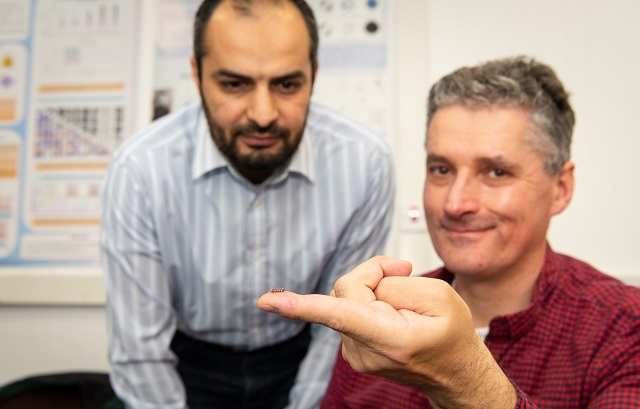

Researchers we fund believe that a chip that reads the body’s own breathing signals could be much more effective than a pacemaker.
 Our heart, like any popular melody, has a vital pulse.
Our heart, like any popular melody, has a vital pulse.
Its beat is never constant, it varies with every breath – speeding up when you inhale and slowing down when you exhale.
But for many of us, it may beat too slowly, too quickly, or irregularly. For those with heart failure, this difference in heart rate can prove deadly.
It’s why pacemakers are fitted to set a regular heart rate, easing a hearts struggle to pump blood properly.
Now, researchers believe a chip that reads the body’s own breathing signals to control one’s heart beat could be much more effective.
So, what makes this chip so special?
Put simply, it delivers better control of heart rate.
Using brain circuits made in silicon, scientists at the Universities of Bath and Bristol have created a new way of reinstating someone’s natural heart rhythm.
When rats used the device for two weeks, the ‘smart pacemaker’ boosted the amount of blood pumped by the heart by a fifth. An improvement of this level has not been seen before.
Record admissions = more strain on hospitals
Recently, we revealed that heart failure admissions had reached record levels in England – rising by a third in the last five years.
That’s an extra 21,000 patients walking into hospitals across England, needing a bed. Meaning more pressure on staff and resources and more stress and heartache for families.
That’s why we’re investing in research that will stem the tide and save and improve lives. While standard pacemakers bring peace of mind to millions of people every day, there is no cure for heart failure – its progression is only slowed by medication.

Chipping in for new hope
This chip – the size of a pen tip – provides new hope for heart failure patients and may revolutionise the future design of heart pacemakers.
The question now becomes: can it lessen the symptoms of heart failure in humans, as it has done in rats?
Thanks to funding from the BHF, fascinating experiments like these provide proof that a new approach could improve treatment and ensure people live longer, happier lives.
Research the key to mending hearts
We need to keep pushing the boundaries of technology and transforming the way we diagnose, prevent and treat heart and circulatory diseases.
Our £1 million Hope for Hearts Fund aims to transform how people with heart failure are cared for by testing initiatives such as using data more effectively or new service models.
All these findings could lead to better beating hearts. Reducing the burden of this cruel disease, and it’s cost on the lives of the people we love.
More BHF Research
Ever wondered which animal has the most complex heart? Or how what you drink can affect your health? How about if you can die from a broken heart?
Our brightest and best life saving research is brought to you each week.



